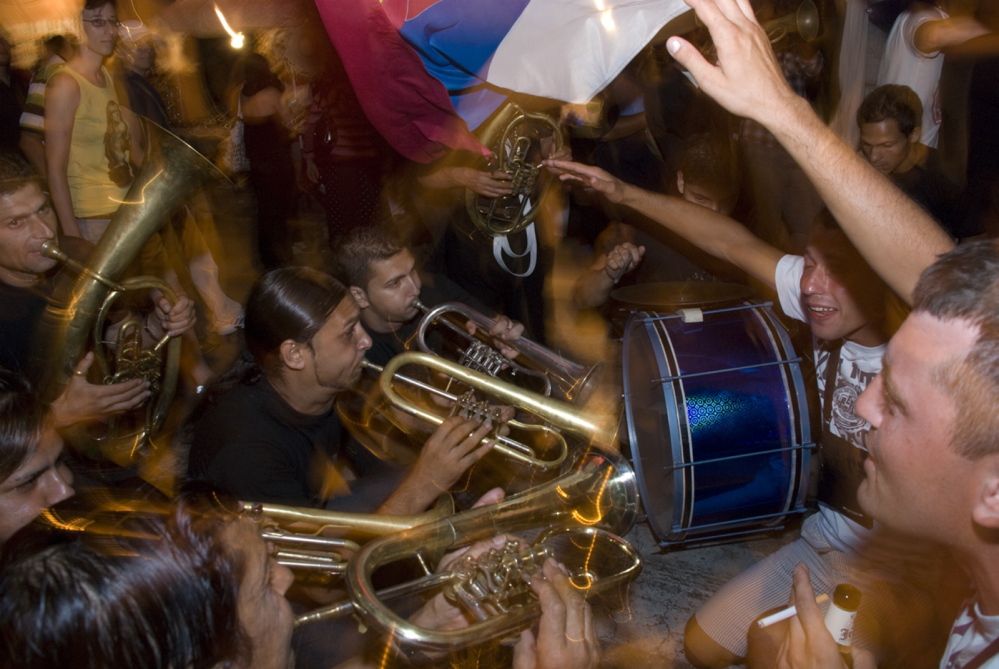Among all the wonderful films from all over the world being presented in this year’s Maine International Film Festival, “Brasslands” is the one that will blow you away, pun intended.
“Brasslands” takes us from Prospect Hall in Brooklyn, where we meet the American Balkan brass band, Zlatne Uste, which means, depending on the user, golden lips or golden mouth. It doesn’t matter, it’s the film that’s golden.
Here in Brooklyn we meet Michael Ginsburg, a middle-school teacher, and his friends and fellow music lovers.
These are retirees and young professionals, who do this simply because they have fallen in love with this kind of music.
They all get together in the summer in what looks like a kids’ summer camp, where they practice and teach each other various aspects of Balkan culture, like learning how to kill a lamb, cut off and roast its head, dress the body and cook it up.
All good friends, they go and play at weddings and dances, anything just to break out their horns and jam.
There is something else here that brings them together, the spirit of competition which takes us off to where it all began — to Guca, an impossibly tiny village in Serbia, where soon, unbelievably, thousands of people from all over the world will come for the 50th anniversary of the Serbian trumpet festival, where a huge international competition is being held.
Our American band friends pack up their brass, put their lives on hold for the summer, and fly off to a part of the world where, back in the 1990s, Bosnians and Serbians were killing one another and President Clinton’s America was part of the NATO bombings.
But today, all of that seems to have been forgotten, at least by the smartphone young.
We find ourselves in Guca, where music- and food-loving adventurers have jammed in to eat the unique Balkan cuisine, and hear some of the world’s greatest purveyors of Serbian music.
Meerkat Media Collective transports us to what soon becomes the music festivals of Woodstock, Monterey, Newport, New Orleans and Paris combined.
The days are full of tourists, and music fans bumping into one another, sharing food and beer and despite the language problems, applauding the music.
The warm nights explode down smoky, colored light-filled cobblestone and dirt streets lined with tented cafes and beer parlors, while onstage, they, and we, are entertained by the greatest festival of brass on the planet.
Meerkat cameras are everywhere, jostling in and out of the crowds, floating overhead and standing backstage with the nervous performers, giving us front row views.
The performers take the stage in several different competitions, and because we’ve spent time with most of them early on, we soon have our own favorites to cheer for. The musicians are divided into the “Whites” being Serbs, whose champion is longtime favorite Dejan Petrovic, and the “Blacks,” being the Gypsies who live in other parts of the mountains, and have their own hero, Roma Gypsy horn man Demiran Cerimovic. It joyfully comes across as a fierce musical soccer game of trumpets and tubas.
Before and after the competitions, the cameras follow some of the groups as they float through the restaurants and beer halls, playing favorite tunes for cash.
Our own team, the Brooklyn Zlatne Uste, join in, even though the common language is hand gestures. Fun, as they say, is for all.
What will strike you most deeply here is not just the music, but the players and their families, the passion for the sounds and the way it all washes over the sins and crimes of that terrible war that so scarred this lovely landscape and its people. “Brasslands” comes not with a sword, but with music.
J.P. Devine is a former stage and screen actor.
Send questions/comments to the editors.



